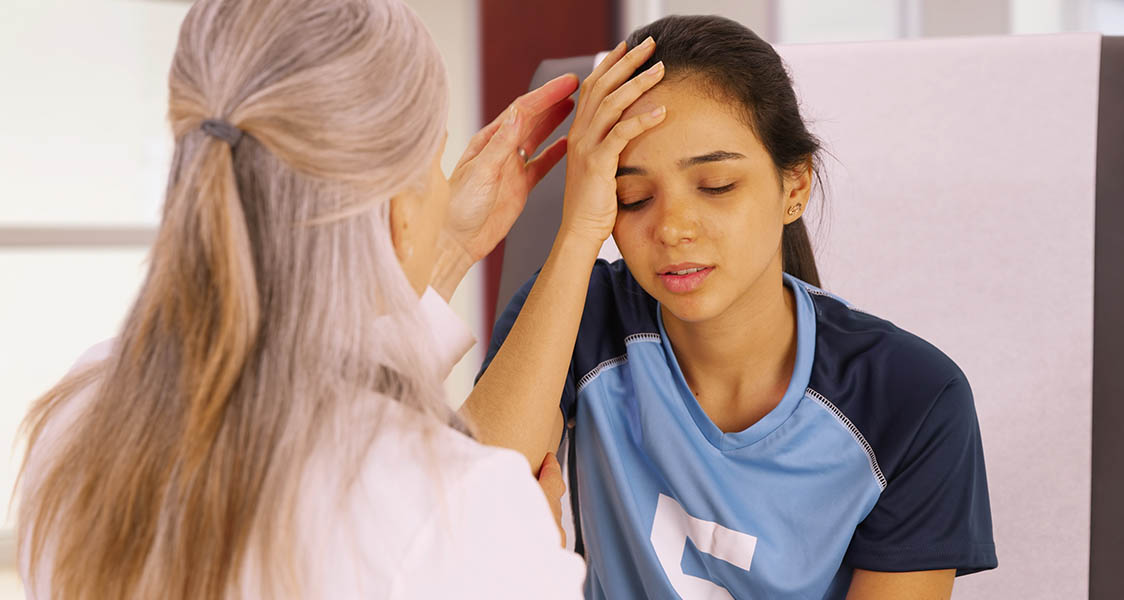With the fall sports’ season beginning, fields across the country are filling nightly with thousands of kids playing football, soccer, and a host of other athletic activities. As the season gets underway, the number of concussions will increase.
Over the past few years, concussion awareness has increased significantly and with it so has the number of reported concussions among young athletes. It is unclear whether the increase in the number of concussions is an actual increase in the injury, an increase in awareness, or both. Early recognition, diagnosis, and treatment for a concussion may reduce severity and recovery time. As an athlete, coach, or parent, it’s important to recognize what signs and symptoms to look for in athletes who may have experienced a concussion.
Any blow to the head from another player, the ground, the ball has the potential to cause a concussion. But a direct blow to the head is not necessary to cause a concussion. Concussions occur when the head stops suddenly and the brain slams into the skull. Injuries that involve the portion of brain where you are hit are called a coup; injuries to the opposite side of impact are called a counter coup.
Signs and symptoms most often related to a concussion include:
- Headache
- Dizziness
- Light-headedness
- Nausea
- Confusion
- Memory loss or slow processing
What to Do if an Athlete Shows Signs of a Concussion
If an athlete has any of these symptoms and if they were hit in the head or had a sudden stop, the coach or parent should assume they have a concussion and have them evaluated by an appropriate health care professional. The player must stop playing immediately.
Most organizations require coaches to be trained in concussion recognition. It is a great idea for youth coaches and parents to be trained as well. There are multiple programs for training, including a 30-minute video from the CDC. The CDC website also includes handouts and information specifically tailored to parents, coaches, and athletes.
Many states, including PA and NJ, mandate that for a scholastic athlete to return to play, the player must be cleared by a licensed physician trained in the evaluation and management of concussions (or by a licensed health care professional with concussion training and designated by such physician). In Pa., licensed psychologist trained in neuropsychology and the evaluation and management of concussions may also clear an athlete to return to play. (Each state has different laws so check your individual state.)
Generally, physicians trained in sports medicine have concussion training and are well versed in current standards of care. If your child has an athletic trainer (AT) at their school, the physician will often arrange to have the athlete functionally tested by the AT in their sport specific activities before being returned to play. Some athletes will have a neuropsychological test, such as computer-based ImPACT to assist in return to play decision.
Most athletes will recover and return to play in 1-2 weeks. If they continue to have concussion-like symptoms, they would benefit from rehabilitation from a physical therapist (PT) or AT trained in concussion rehabilitation. This helps athletes overcome many of the symptoms related to a concussion and return to play safely. If symptoms re-occur during practice or game, the coach should remove the player and have them re-evaluated.
Keeping athletes safe is an important responsibility for everyone involved in youth sports including coaches, parents, athletes, and health care professionals. Recognizing concussions and assuring that athletes are treated by the appropriate health care professional will help assure that athletes are removed from play timely and return to play when safe and cleared by the appropriate physician.
For more information about concussion therapy at Penn Medicine | Good Shepherd Rehabilitation Outpatient Therapy, call 877-969-7342 or request an appointment online.

